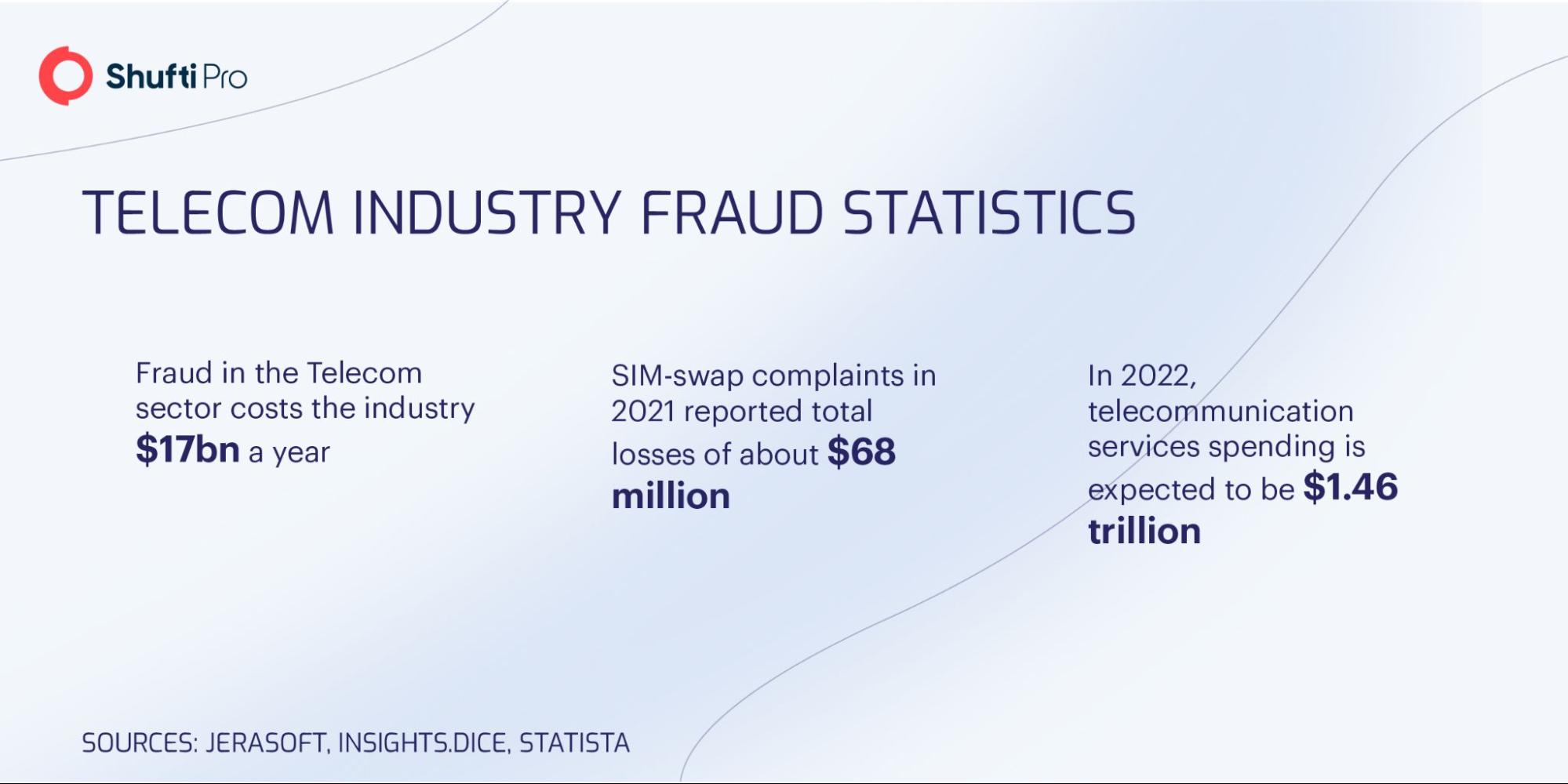
Identity Verification – Combating Fraud in the Telecommunication Sector



BEFORE YOU GO...
Check how Shufti Pro can verify your customers within seconds
Request DemoNo thanks
Developing technology, rapid growth in digitization, and increased use of digital transactions have become responsible for many users’ data shared on the internet. To participate in telecommunication, users have to insert their personal information which ultimately becomes a route for fraudsters to commit financial crimes like identity theft and monetary scams.
As the telecom industry entirely depends on digitization, there is a need for effective identity verification measures to reduce the potential risk of cyber crimes and illicit activities.
Concurrently, the telecom sectors are facing fraudulent ventures like SIM swap scams and identity theft, both of which are surging due to a lack of efficacious IDV solutions.
Fraud in the telecom industry has caused loss of about 2.22% in revenue, which is equivalent to $39.89 Billion. Censoring financial crimes and identity theft through strict measures has become compulsory for the smooth onboarding of customers in the telecom sector.
Users can make instantaneous payment transactions with the help of smartphones and other devices. Consumers must understand that their personal data is always vulnerable to cyberattacks due to online exchange procedures.
Any loopholes in the network can lead to the exploitation of the system and as a result identity theft, monetary crimes, and account hacking can happen. As reported by the CFCA (Communication Fraud Control Association), Telefonica Group faced a monetary loss of $900 million as a result of external attacks.
SIM farm fraud is another common approach used by criminals to exploit the telecom sector. Following this method, bad actors receive payments and send SMS messages to multiple recipients to extract their private data. After doing so, they try to hack users’ social media accounts and other financial accounts like digital wallets with the assistance of OTPs (One-time passwords).
T-Mobile, one of the well-known names in the telecom industry, was reported to be exploited by a gang implementing a SIM swap technique. During the COVID-19 pandemic, phishing scams were also surging when deceitful vaccine certificates were used to gain victims’ financial information. These prevailing scams summon the global regulatory bodies for shielding the telecom industry.
With the help of hacking techniques, SIM-swapping scams are frequently occurring when users’ private data is transferred to the SIM of a scammer online. Hackers can then gain access to customers’ financial information and can also misuse the data. The confidential data may include emails, credentials, and banking details. The telecommunication sectors must acquire a risk-based approach to analyze and eliminate such fraudulent ventures.
After the telecom sector provided its user’s zero-rate calls, it became clear that the sector requires and uses the finest accessible precautionary measures. The industry must make an effort to detect scams while making certain a fair service usage approach. Measures must be taken to detect and keep record of customers’ use of telecommunication services. Moreover, authorities should take up the role of monitoring networks to identify criminal activity.
There are now solid applicable solutions in the market for telecom service providers to look out for suspicious activities and prevent SIM swap fraud with the help of devices that show unusual usage patterns. For instance, warnings can be sent out to customers if suspicious activity is detected beforehand. Suspicious activity can be monitored by observing the traffic coming from a certain locality through mobile devices that are sending substantial numbers of SMS messages containing a link. Fictitious activities can also be analyzed through IMEIs that show significantly higher data usage compared to other devices in a shorter duration of time.

KYC is the act of authenticating users’ identities that is performed by banks and other financial organizations handling financial operations. It particularly prevents the risks of identity fraud and keeps a strict check on both customers and telecom service suppliers.
In many countries, KYC measures are supported by governments as part of the AML (Anti-Money Laundering) directives and as part of measures to regulate smartphone operators from objectionably becoming the cause of criminal activity and terrorist financing. In areas where KYC measures are not reinforced by governments, telecom operators must adopt vigorous identity verification solutions to prohibit fraudulent institutions from getting hold of their systems.
Digital identity verification solutions utilize technologies like biometric facial recognition that are analyzed by algorithms with thousands of AI models to detect the true identities of telecom companies’ users’. KYC measures make sure that companies run background checks on their customers to figure out whether they are connected to PEPs (Politically Exposed Persons) in addition to checking their presence in sanctions lists globally.
Like any other sector, eliminating telecom fraud is pivotal for smooth operations in the telecom industry. A number of countries have established telecom authorities that are responsible for regulating the industry and ensuring the adoption of standard measures to deter fraud. Here are some examples of regulatory authorities in countries around the world.
Since the perpetual outrage in telecom fraud, Australian Communication and Media Authority is taking strict measures to eliminate telephonic and SMS scams. Modern regulations require scam messages to be censored, identified, and blocked immediately. According to an analysis performed by the Australian Competition and Consumer Commission (ACCC) analysis, 32% of all reported scams were SMS scams. According to the new Australian Code, mobile companies could face hefty fines of up to $250,000 for SMS scams. The mobile companies in Australia will also be required to share the scam reports with other regulatory authorities.
The main regulatory authority responsible for establishing the laws regarding the telecom sector in the USA is the Federal Communications Commission (FCC). It primarily regulates national and international telecommunications, mobile services, radio, and to some extent, cable television content. The services of the FCC are supervised directly by the House of Representatives and Senate.
The Office of Communication (Ofcom) is the regulator for the UK’s telecommunication sector. It mainly regulates radio, TV, mobile phones, fixed-line telecoms, and the airwaves over which wireless devices operate. Ofcom works inline with the Communications Act 2003 to exempt fraudsters from the telecom sector. The legislation authorizes the regulation of the telecom industry, ensures basic customers’ rights, and sets out the obligations of Ofcom as the national regulator.
The global telecommunication industry and transmission service contributors are being threatened by cybercriminals and finding it difficult to mitigate scams. As a result, digital accounts and wallets are more likely to be compromised. Thus, the reliability, as well as the reputation of telecom service providers, is at risk.
Shufti Pro’s identity verification solution empowers companies in the telecommunication industry by mitigating fraud risks as they authorize mobile phone service providers to verify clients’ identities before getting them on board.
Ready to discover more about Shufti Pro’s identity verification solutions?